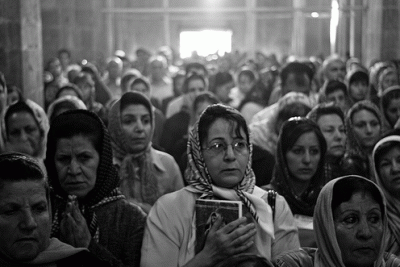 The Armenian Apostolic Church (Armenian: Հայ Առաքելական Սուրբ Եկեղեցի, Hay Aṙak̕elakan Surp Yekeġetsi, officially Հայաստանեայց Առաքելական Սուրբ Եկեղեցի, Hayastaniayts Aṙak̕elakan Surp Yekeġetsi) is the world's oldest national church.[1][2][3][4] It is part of Oriental Orthodoxy and is one of the most ancient Christian communities.[5] Armenia was the first country to adopt Christianity as its official religion in AD 301, in establishing this church.[6] The Armenian Apostolic Orthodox Church claims to trace its origins to the missions of Apostles Bartholomew and Thaddeus in the 1st century and is an early center of Christianity. It is sometimes referred to as the Gregorian Church but this name is not preferred by the church itself, as it views the Apostles Bartholomew and Thaddeus as its founders, and St. Gregory the Illuminator as merely the first official governor of the church.  History Legends tie the origin of the Armenian Church to the Apostles. Apostolic succession is an important concept for many churches, especially those in the east. The legend of the healing of Abgar V of Edessa by the facecloth of Jesus has been appropriated by the Armenian Church in claiming that Abgar was a prince of Armenia. The more common tradition claims that St. Thaddaeus, one of the Twelve Apostles, was sent to Armenia from nearby Edessa by Abgar (uncle of King Sanatrook of Armenia) to evangelize. The details of the story vary widely, but in all stories, Thaddeus converted Sandookdht, the king's daughter. In some versions, Sanatrook was converted and later apostatized. In other versions, he was never converted but was always hostile to Christianity. Sanatrook martyred both Thaddeus and Sandookhdt. Some versions have the apostle St. Bartholomew arriving in Armenia about the same time to be martyred. Christianity reached Armenia at an early date; persecutions against Christians in 110, 230, and 287 were recorded by the outside writers Eusebius and Tertullian. The Kingdom of Armenia was the first state to adopt Christianity as its religion when St. Gregory the Illuminator converted King Tiridates III and members of his court, an event dated to AD 301. Gregory, trained in Christianity and ordained to the presbyterate at Caesarea, returned to his native land to preach about 287, the same time that Tiridates III took the throne. Tiridates owed his position to the Roman Emperor Diocletian, a noted persecutor of Christianity. In addition, he became aware that Gregory was a son of Anak the Parthian, the man who assassinated his father.  Tiridates imprisoned Gregory in an underground pit, called Khor Virap, for 13 years. In 301, 37 Christian virgins, among whom was Saint Nune (known as St. Nino in Georgia), entered into the Iberian kingdom in the Caucasus from the Kingdom of Armenia; she escaped persecution at the hands of Tiridates III. St. Nino later became the founder of the Georgian Orthodox Church. Tiridates desired Rhipsime to be his wife, but she refused. Enraged, he martyred all of them. According to legend, God struck him with an illness that left him crawling like a beast. (The story is reminiscent of Nebuchadnezzar II in Daniel 4.) Khosrovidukht, the king’s sister, dreamed that she was told that the persecution of Christians must stop. She told Tiridates, who released Gregory from prison. Gregory healed Tiridates, who converted to Christianity and declared Armenia to be a Christian nation. It was the first. Tiridates declared Gregory to be the first Catholicos of the Armenian Church and sent him to Caesarea to be consecrated. Upon his return, Gregory tore down shrines to idols, built churches and monasteries, and ordained many priests and bishops. While meditating in the old capital city of Vagharshapat, Gregory had a vision of Christ's coming to the earth to strike it with a hammer. From the spot rose a great Christian temple with a huge cross. He was convinced that God intended him to build the main Armenian church there. With the king's help, he did so, along the lines of his vision. He renamed the city Etchmiadzin, which means "the place of the descent of the only-begotten". Initially the Armenian church participated in the larger church world. Its Catholicos was represented at the First Council of Nicea (325) and the First Council of Constantinople (381). Although unable to attend the Council of Ephesus (431), the Catholicos Isaac Parthiev sent a message agreeing with its decisions. The Armenian Church began to distance itself from the Roman concept of the Universal Church when, in 373, King Papas (Pap) appointed Catholicos Husik without first sending him to Caesarea for commissioning. Christianity was strengthened in Armenia in the 5th century by the translation of the Bible into the Armenian language by the native theologian, monk, and scholar St. Mesrob Mashtots. Before the 5th century, Armenians had a spoken language, but it was not written. Thus, the Bible and Liturgy were written in Greek or Syriac rather than Armenian. The Catholicos Sahak commissioned Mesrob to create an Armenian alphabet, which he completed in 406. Subsequently the Bible and Liturgy were translated into Armenian and written in the new script. The translation of the Bible, along with the translation of other works of history, literature and philosophy, caused a flowering of Armenian literature and a broader cultural renaissance. Unlike the Bible used in other Eastern Churches, the Armenian Bible originally had 39 books in the Old Testament. What are commonly called the Apocrypha or Deuterocanonical books were not translated until the 8th century and not read in the churches until the 12th century.
|
ADVERTISEMENT